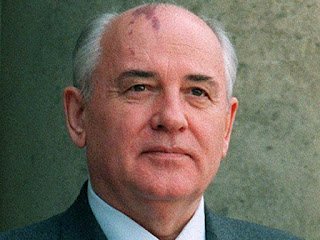Gorbachev was born on March 2, 1931 in the Stavropol Krai. He came from a Ukrainian-Russian family living in a small village where his father worked as a farm mechanic. At the age of 14, little Gorbachev began working as an assistant in combining harvest workers. He is a hardworking boy and has won several awards for his efforts. In 1950, Gorbachev studied to Moscow State University and graduated with a degree in law.

image source [1]
Since school, Gorbachev became active in the organization of the Communist Section of the Soviet Union. He met Raisa Maximovna Titarenko at the University of Moscow, a philosophical student from Siberia, who in 1953 married him. Gorbachev graduated in 1955 and with his wife moved to Stavropol. Two years later, they got a daughter named Irina Mihailovna Virganskaya.
In 1962, Gorbachev was elected to the position of the Communist Party of Stavropol. He is further responsible for agricultural and industrial affairs. At the same time he also takes care of the administration. Gorbachev then took a second degree in agriculture at the Stavropol Institute of Agriculture.
Due to his active and enthusiastic participation in the communist party, he was elected first secretary of Kraikom Stavropol in 1970. Subsequently in 1974 he was appointed First Secretary of the Supreme Soviet and in 1979 he became a member of the Politburo. He was General Secretary of the Communist Party since 1985. When he served as Secretary-General, he met various countries and managed to build good relations with them. Gorbachev is respected by the states for his humble and amicable nature.
After four years of serving as Secretary-General, he was appointed Executive President of the Soviet Union by parliament. In 1986, Gorbachev issued a radical policy after a pretation of bureaucratic resistance he faced. He designed the perestroika (rebuilding) of the economy and society. Democratization and openness must be immediately applied in the communist system. This Gorbachev policy then weakened the communist Soviet Union. Economic instability forced the three Baltic, Estonian, Latvian and Lithuanian republics against the leadership of the Soviet Union. In 1990, Boris Yaltsin who was elected chairman of the Russian parliament in June 1991 was elected President of Russia. He is a toughest critic of Gorbachev's policies.
Faced with pressure from its supporting countries, the dissolution of the Soviet Union was only a matter of time. On August 19, 1991, conservative communist groups committed a coup against Gorbachev's rule. Finally, Gorbachev resigned after communism failed on December 25, 1991. After resigning, Gorbachev built his own party called Social Democratic Party to gather all the Russian democratic parties to the family. Gorbachev had competed in the seat of the Russian presidential election in 1996 but was unable to compete with Yeltsin. Gorbachev for his services had gotten a
Nobel Peace Prize in 1990.